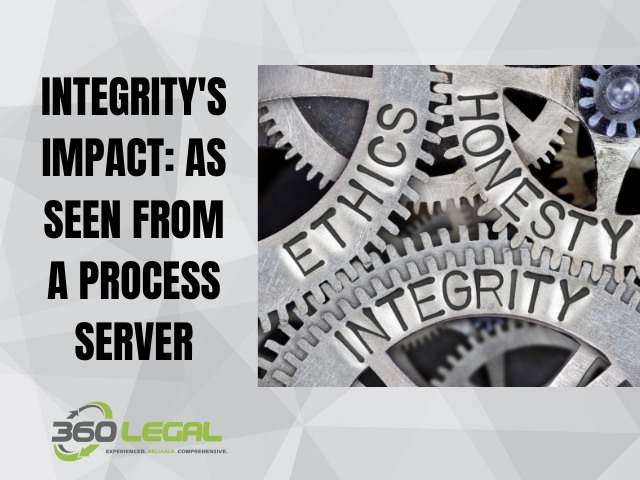Testing RSS Feeds.. ignore post.
Testing RSS Feeds.. ignore post.
Integrity’s Impact: As seen from a Process Server

Introduction to Integrity in the Legal System
When one considers the concept of justice, integrity naturally arises as one of its foundational pillars. In the sphere of the legal system, integrity spans a broad range of interactions, from courtroom proceedings to the actions of process-serving companies. This article delves into the enduring implications of integrity for case outcomes, focusing on the role played by process servers.
The Crucial Role of Process-Serving Companies
Process-serving companies play a crucial, albeit often overlooked, role in the justice system. They serve legal documents – including summonses, complaints, subpoenas, and writs—delivered to the appropriate parties. Their work directly influences the course of legal proceedings and, by extension, case outcomes. In this context, the importance of integrity cannot be overstated.
How Integrity Affects Case Outcomes
The integrity of a process serving company affects case outcomes in various ways, including ensuring adherence to due process, enhancing credibility, fostering trust, and encouraging cooperation among all parties involved.
Adherence to Due Process
Adherence to due process is a fundamental aspect of justice. It ensures that all parties are given a fair chance to present their case. As the bearers of important legal documents, process servers must operate with integrity to maintain this cornerstone of the legal system. Failing to serve papers accurately and promptly or misrepresenting service can result in delays, dismissals, or unjust results, creating lasting implications for the parties involved. Hence, the integrity of process servers directly impacts the efficacy of the justice system.
The credibility of a process-serving company is another significant factor influencing case outcomes. Reliable, honest process servers build a strong reputation within the legal community. Their credibility influences the perception of lawyers, court staff, and even judges. Parties are more likely to trust the integrity of the service if a reputable process serving company executes it. Conversely, if a company is known for unethical or dubious practices, its actions can cast doubt over the entire proceedings, potentially prejudicing case outcomes. When seeking a process serving company, look for one bonded and insured, ensuring professionalism, trustworthiness, and compliance with legal standards.
Building Trust Through Professionalism
Trust, a byproduct of integrity, is vital to the smooth functioning of the legal system. Trust between process servers and the individuals they serve ensures cooperation and compliance with court orders. Ethical process servers understand that their actions reflect on their company and the justice system. Despite the often tense circumstances, their conscientious efforts to treat every individual with respect and professionalism foster trust and can positively affect compliance rates. This trust eventually translates into efficient case progression and fairer outcomes. 360 Legal is known for reliable process serving, with a commitment to accuracy, integrity, and timely service
Encouraging Cooperation Among Parties
Finally, process servers with a strong sense of integrity encourage cooperation from all parties involved. They foster a transparent environment wherein defendants, plaintiffs, and their attorneys are more likely to collaborate. If done accurately and ethically, the information they deliver can facilitate an honest dialogue among parties, potentially leading to settlements or swift resolutions. Cooperation inspired by integrity can significantly impact the timeline and outcome of cases.
Balancing Efficiency with Ethical Conduct
However, maintaining the integrity of a process serving company takes time and effort. Companies must balance the pressure to perform quickly and efficiently with their commitment to ethical conduct. The potential for conflicting interests between client demands and legal obligations necessitates robust ethical guidelines and consistent training for process servers. Rigorous oversight and accountability measures should be in place to deter deviations from these standards.
efficiently with their commitment to ethical conduct. The potential for conflicting interests between client demands and legal obligations necessitates robust ethical guidelines and consistent training for process servers. Rigorous oversight and accountability measures should be in place to deter deviations from these standards.
The Use of Technology in Ensuring Integrity
In the modern age, technology has become an essential tool for process-serving companies in maintaining and enhancing integrity. Using specialized software and systems, such as 360 Legal’s 360 TotalView™, provides a layer of transparency and accountability that was previously unattainable.
- Real-Time Tracking and Reporting: Systems that offer real-time tracking and reporting allow clients to monitor the progress of their service requests at every stage. This level of visibility promotes trust and ensures that the process is carried out according to legal standards.
- Documentation and Compliance Management: Through digital platforms, process-serving companies can systematically manage compliance with various jurisdictional rules, ensuring that the correct service methods are being used and documented. Electronic records offer a clear and accessible trail of actions, further supporting adherence to ethical guidelines. 360 Legal’s 360 TotalView™ is an industry-leading client portal, provides real-time updates, custom reporting, and comprehensive case management
- Accessibility Across Platforms: By making these systems available on Cloud, Desktop, or Mobile, process-serving companies empower their clients with the flexibility to manage and review their cases from anywhere. Such convenience enhances efficiency and fosters a closer partnership between legal teams and process servers, encouraging open communication and ethical conduct.
- Vendor Management and Cost Control: Sophisticated tools allow clients to manage service costs and maintain real-time vendor report cards, ensuring they know financial and performance aspects. This dual focus promotes accountability and aligns the process-serving company’s and its clients’ interests.
- Security and Privacy: With sensitive legal information at stake, the integrity of data protection is paramount. Industry-standard technology must be implemented to secure personal information and maintain confidentiality, further underscoring a company’s commitment to ethical practice.
The integration of technology in process serving not only augments efficiency but also catalyzes maintaining integrity. It enhances transparency, accountability, and collaboration, creating an environment where ethics are not merely a compliance requirement but an ingrained part of the process. As the legal landscape continues to evolve, the fusion of technology and integrity will likely become even more vital, making it a key area of focus for process-serving companies striving to uphold the highest standards in their operations.
This new section further emphasizes how technology is not merely a tool for efficiency but is deeply intertwined with the integrity of the process. Outlining various aspects of technological integration and their implications on integrity adds another dimension to understanding the subject. It also aligns well with the existing content, enhancing the comprehensive nature of the article.
Training and Regulation in Maintaining Integrity
The training and regulation of process servers are vital components in maintaining the integrity of legal proceedings. A process serving company’s ethical conduct must be instilled through continuous education, professional development, and adherence to industry standards and regulations. State and local laws often define the procedures and requirements for process serving, and understanding these nuances is essential for accuracy and compliance. Comprehensive training programs that emphasize both the technical aspects of service and the ethical considerations ensure that process servers are equipped to navigate complex legal scenarios responsibly. Regular assessments, audits, and reviews reinforce these principles, creating a culture where integrity is not just an expectation but a practice. In this way, the industry can work collectively to build trust, foster cooperation, and contribute positively to the justice system, affirming the indispensable role of integrity in the legal framework.
Long-term Effects on the Justice System
The effects of integrity on case outcomes extend beyond the immediate legal proceedings. Cases resolved with integrity form a benchmark for future legal actions, strengthening the fabric of the justice system. They reinforce societal faith in the legal process and encourage respect for the rule of law. Ultimately, it falls upon the shoulders of process-serving companies to uphold this high standard of integrity, impacting not just individual case outcomes but also the broader perception of justice.
Conclusion
In conclusion, integrity’s implications for case outcomes, from the perspective of a process-serving company, are profound and far-reaching. As essential conduits between the court and the parties involved, process servers’ integrity plays an instrumental role in upholding the principles of due process, fostering credibility and trust, and encouraging cooperation. Their ethical actions underpin the successful navigation of legal proceedings, bearing lasting effects on case outcomes and the justice system. Therefore, we must acknowledge and uphold the value of integrity within this pivotal role for justice and fairness in all legal works.
Author
We are Social!
Latest tweets
Popular Tags
Testimonials
"5 star service ! prompt serving, helpful, professional . "
"Mike is awesome. Our firm has hired him on several occasions and we are very happy with his work. His prompt serving, helpful, professional and always in communication. I recommend him highly! "
"360Legal provides speedy and easy to use Process Service that is flexible, and very transparent with nearly instant reporting. It is very helpful for us to be able to track the status of our process service jobs, especially when they are time sensitive. "
Latest News
-

RMAI 2021 Annual Conference RMAI Annual Conference
April 12-15, 2021 -

NATIONAL CREDITORS BAR ASSOCIATION 2020 SPRING CONFERENCE
May 19-21, 2021 -

ALFN ANSWERS 2021
Jul 18-21, 2021 -

Annual Convention and Expo
Oct. 17-21, 2021 -

Florida Association of Professional Process Servers 33rd Quarter Board Meeting/Professional Beach Getaway
Aug. 20-22, 2021












